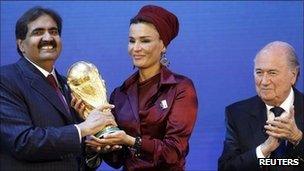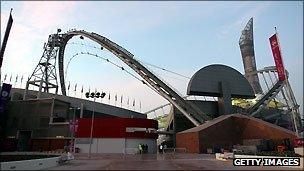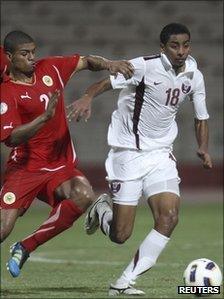World Cup 2022 challenges for Qatar to tackle
- Published

Qatar now has 11 years to prepare for the 2022 World Cup
To say the football world was shocked when Qatar was given the right to host the 2022 football World Cup would be an understatement.
Critics, and many still remain, wondered how such a massive event could be held in a country with a total population less than Greater Manchester's, and where the summer temperature can reach 50C.
However, the man at the helm of organising the tournament insists criticism is misplaced and that the Middle Eastern Emirate will be able to stage a memorable tournament 11 years from now.
Hassan al-Thawadi, the secretary-general of the Qatar 2022 Supreme Committee, is looking to provide a World Cup memorable for all the right reasons.
Mr al-Thawadi said that two billion people were within a four-hour flight of Qatar, and that the World Cup would "build bridges of understanding between the Middle East and rest of the world".
And some bridges need to be built.
He said that since Fifa had awarded it the tournament, the emirate had faced an "avalanche of accusations and allegations" relating to claims it had bribed its way to securing the World Cup.
Mr al-Thawadi said Qatar had in fact conducted its bid campaign "to the highest ethical and moral standards".
'Promises'
Now he wants to focus on leaving a "bold legacy" from hosting a World Cup which some analysts estimate could cost as much as £138bn to bring about.
Qatar hopes to leave a legacy in the areas of football development, air-cooling technology, building modular stadiums (which can be downsized after the event), and fan experience.

New stadiums will be built and existing ones will have their capacity extended
"We can deliver... and fulfil the promises we made to the world," Mr al-Thawadi told delegates at the Leaders in Football conference in London.
He said Qatar has been drawing inspiration about how to host a successful event from a number of sources, including London 2012.
The small nation, population 1.7 million, is now looking to appoint a project management company by the end of the year - "a crucial appointment which we must get right".
It is also looking to draw up a "master schedule" for stadiums and infrastructure, in order to resolve any potential pitfalls on the road to 2022 as soon as possible.
There will be 12 stadiums in use at the World Cup, and it is hoped the first new one with air-cooling technology with will be in place by 2015.
Cooling
In addition, Mr al-Thawadi said the 2022 World Cup would benefit from a "state-of-the-art transport infrastructure" which needed to be largely constructed from scratch.
The official said that the small size of the emirate meant fans would be able to stay in the same hotel for the duration of the tournament, and also to travel easily and take in two games in one day at different venues.
One on the thorny question of temperature, the country says it is also developing air-cooling techniques.
"Technology is already being trialled in open spaces in Qatar," says Mr Al al-Thawadi.
There has been talk of moving the World Cup to the winter, but this notion has been scotched my many, including the German football federation.
"We submitted a bid that looks towards hosting a summer World Cup - we are moving towards that," says the 2022 supremo.
He said it was up to the global football community to come to any unanimous decision if that situation was ever to be changed.
Meanwhile, nine of the stadiums being used will be modular, and Qatar will donate 170,000 seats to developing countries after the World Cup, when stadiums are slimmed down.
That he said, meant the country would not be lumbered with any large "white elephant" rarely full stadiums after 2022.
Alcohol
For potential visiting fans, Mr al-Thawadi wanted to quell fears that there would be nothing for them to do after matches.
"There is significant investment in tourism in Qatar, museums and entertainment sites, and a service industry dedicated towards fans," he says.
"We have always said alcohol would be available. It might not be as available as it is in London, but any fan that wants to enjoy a drink can do so."
He said the Qatar public would also be prepared for the influx of fans and, for example, their different dress sense.
In addition, he said Qatar was host to many different communities, including English people, and was "used to being hospitable".
He added: "We have hosted major events over the years" - including the 2006 Asian Games.
Catalyst
The country has also applied to host the 2017 World Athletics Championship - in competition with London - and also the 2020 Olympics.
"The Olympic Games bid is not a distraction to 2022, and may be an opportunity for some synergies with the World Cup."

It is hoped the 2022 World Cup will help improve football quality in Qatar
Hosting these large sporting events could, he said, be used as "an economic tool".
"The World Cup can be a catalyst of economic change," he believes, not only for Qatar but for the whole Middle East region.
He said a number of yet-to-be-revealed initiatives were in the pipeline to involve other Middle East countries' participation in the World Cup.
Finally, on the playing field, it is hoped that 2022 will provide the same boost to football in West Asia that the 2002 World Cup in Korea and Japan did for East Asia, particularly the two host countries.
"We want people to come and explore, and learn about us," he says.
"We are confident and excited that this will leave a legacy of understanding, and that people can unite through a shared love of football."